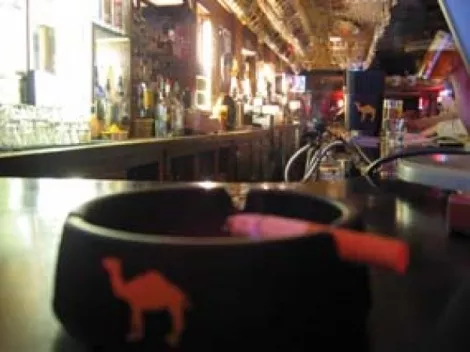
The ball that banned smoking in Utah bars dropped Jan. 1 at midnight, taking official effect just as bar patrons were singing “Auld Lang Syne” and kissing whomever happened to be standing next to them. There is now no legal public place left to light up indoors in Utah.
nSome bars, including Lumpy’s downtown, have been preparing for the ban for weeks, readying outdoor heaters for smoking customers they anticipate will huddle outside or creating expedited exit-entry systems to accommodate a stream of smokers going in and out.
nRick Hoover, owner of the Cell Block, is trying to put the best face on the new reality. “A lot of the customers say they will stay home, but I know they won’t stay home forever,” he says. “And a lot of the customers are happy about it. Even some smokers don’t like the way their clothes smell when they go home.”
nTony Chlepas, owner of the frequently smoky Cotton Bottom Inn, has been looking forward to the smoking ban, which he expects will help his wintertime lunch crowd. He already sees significant lunch traffic from Cottonwood Heights businesses during summer months when smokers can use his patio. In winter, however, smoke and customers are trapped inside, he says, and people don’t want go back to work smelling of smoke.
nChlepas thought about going nonsmoking last year, but that would have meant angering smoking regulars. “It’s a lot simpler to say to somebody who has been in for 20 years, ‘I’m just obeying the law,’” he says. “I haven’t heard anybody complain yet.”
nUtah health-department authorities, who are tasked with enforcing the bar smoking ban, expect the snuff-out will happen without much trouble from bars or smokers. “This isn’t unexpected,” says David Neville, with the Utah Health Department’s tobacco prevention and control program. Utah’s Legislature passed the ban in 2006, but gave bars three years’ grace.
nIn preparation for the ban taking effect in private clubs, state and local health departments are offering Utah bars shot glasses, table tents, cocktail napkins and glowing necklaces—all plastered with cute messages informing patrons that as of midnight, Dec. 31, smoking is banned in private clubs. The fine for individuals smoking after that date is $100. A second violation can be up to $500. And if the health department decides a bar is flouting the law, it can levy a fine of up to $5,000 per violation. But in the early going, a bar owner is likely just to get a simple phone call offering help, probably in the form of more signs, says Kathy Baebler with the Salt Lake Valley Health Department.
nNeville claims other states saw bar business increase after smoking was banned. But not every Utah bar is convinced, or going along quietly.
nBob Brown, owner of Cheers to You in downtown Salt Lake City, has filed paperwork with the health department asking for a delay in enforcement pending interpretation.
nThe Utah Indoor Clean Air Act, which regulates smoking in public places, now including bars, prohibits smoking any “tobacco product,” Brown notes. But the only place Brown could find “tobacco product” defined in Utah law was in the tax code, and there it says, “‘Tobacco product’ does not include a cigarette.” Cigarettes are regulated differently than other tobacco products.
nBrown, who early on lobbied against the smoking ban with the bar-owners group Utah Hospitality Association, remains convinced the ban will hurt his business.
nHe predicts the smoking ban will mostly hit small bars like his. Clubs with dancing or live music should do fine, he says, “but my bar, it’s a neighborhood bar where the local industry goes when they get off work.” Eighty-five percent of his clientele smokes. “It scares me to death,” says Brown, who predicts his customers will now spend a lot of time outside and “forget about coming back in to get another drink.”
nAn attempt to forge some breathing room for bars that cater to smokers could come as early as mid-January. State Rep. Neil Hansen, D-Ogden, is writing a bill that would allow smoking of tobacco inside businesses that do at least one-fourth of their sales in tobacco.
nHansen’s proposed amendment to the Utah Indoor Clean Air Act might carve out a loophole for Salt Lake Valley’s handful of hookah bars—private clubs like The Huka Bar, Ouida’s Lounge and Saints & Sinners—that offer patrons the opportunity to suck from a communal water pipe.
nEven without an exemption, there is a way hookah bars can continue operating in Utah. The Utah Indoor Clean Air Act outlaws smoking tobacco. Smoking something else in your hookah is just fine, Neville says, as long as hookah lounges can prove it.
nIn anticipation of this year’s smoking ban, the downtown hookah bar Ouida’s Lounge switched the tobacco-based shisha in its hookahs to an herb-and-fruit mixture eight months ago. “The customers never noticed the difference, hardly,” says lounge owner Ouida Sepher-Nik.
nShe hopes the switch will be enough to keep her business open. “This was set up as a hookah lounge. You can’t destroy a business just because it has smoke,” she says.
nTo bolster the argument that she is sure is coming from health officials, Sepher-Nik has been gathering information from the health department in California where herbal hookah lounges still operate inside the law despite a general bar smoking ban.
nThe argument shouldn’t be difficult. She imports her herbal mix from California. And Utah has been letting the stuff in without a tobacco-tax stamp.